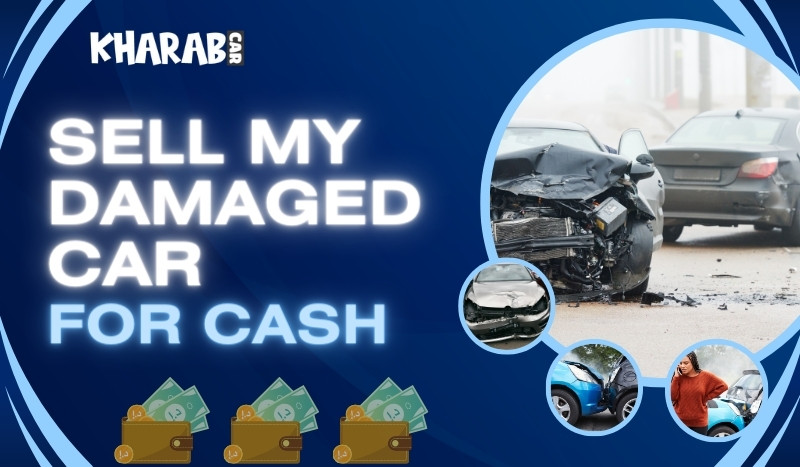- Barsha Heights - Dubai
- info@kharabcar.com
- +971 55 722 7700
Sell My Damaged Car For Cash

Sell My Damaged Car For Cash
Do you want to sell your damaged car? You're in luck, though! We'll walk you through the process of selling your car and earning the most money for it in this post. We know it might be difficult to manage with a damaged car, but don't worry—we've got you covered. So take a seat back, unwind, and allow us to demonstrate the hassle-free car-selling process.
Essential Tips to Sell My Damaged Car for Cash
To determine the car's exact condition and value, check for damage to the engine compartment, exterior, interior, and tires.
- To choose a trustworthy buyer, look out for respectable salvage yards or junkyards and contrast offers from other purchasers.
- To gain the trust of prospective purchasers, take crisp pictures and include textual evidence of the vehicle's condition.
- Before getting ready for the sale, give the automobile a thorough cleaning, take care of any small problems or damages, gather pertinent paperwork, and find out how much it will sell for.
Analysing the Harm
I'm going to begin by determining how much damage your car has sustained. Knowing the extent of the damage is crucial before determining whether or not to sell it. Examine your car's exterior thoroughly first. Are there any paint chips, dents, or scratches? They may have an impact on its whole worth. Verify whether any lights are also damaged or broken.
Examine the engine bay after opening the hood. When you start the engine, listen for any leaks or strange noises. This can be a sign of expensive mechanical problems that need to be fixed.
Proceed to inspect your car's inside. Are there any stains on the seats or rips in the upholstery? Additionally, make note of any broken buttons, knobs, or switches. Even though these physical flaws might not affect functionality, they could nonetheless have an impact on how prospective car buyers see you.
Remember to check all four tires for damage and wear on the tread. If they exhibit uneven wear or serious damage, it may be essential to replace them before sale.
Finally, determine whether there is any structural damage, such as bending frames or misaligned panels, from collisions or accidents. These kinds of problems may significantly impact your car's safety and worth.
When negotiating with prospective purchasers or obtaining an appraisal from a qualified mechanic, keep in mind that precisely evaluating and recording any damages will be essential. With this knowledge in hand, you'll be better able to assess if it makes financial sense to sell your damaged car and choose a fair asking price.
Recognizing Your Car’s Worth
It can be difficult to determine a damaged car's worth, but there are tools available to assist. You should know exactly how much your damaged car is worth when selling it to ensure you receive the greatest deal. An online tool for appraisal is one resource that might help you with this procedure.
These tools determine the worth of your car based on its make, model, year, and condition using algorithms and market data. You can obtain a ballpark estimate of the value of your damaged car by providing these tools with precise details about it.
Consulting experts in the automobile sector is another beneficial resource. Auto appraisers or mechanics with expertise in evaluating damaged cars can offer professional opinions on how much your automobile is worth. They will consider things like the degree of the damage if it interferes with the operation of vital parts like the engine or gearbox, and the cost of repairs.
You can also find out how much local salvage yards or garbage yards would be willing to pay for your damaged car by getting in touch with them. These companies may provide you with immediate cash offers and frequently acquire cars for scrap metal or parts.
Finally, have a look at online classifieds where individuals are selling their damaged vehicles. Look for listings with the same make, model, and condition as yours. This can help you comprehend what other people are requesting for comparable cars.
Recall that there are many variables that might affect the price of a damaged car, making it impossible to determine its exact value. It's a good idea to look into a few different sources before deciding on car pricing.
Locating a Reliable Car Buyer
Start your hunt for a trustworthy buyer for your wrecked car by looking up respectable junkyards or salvage yards in your neighborhood. These shops specialize in the purchase and sale of secondhand automobiles, especially ones that are wrecked or non-operational. You can be confident that the transaction will go well and that you will receive a fair price for your car by locating a reliable salvage yard.
Seeking suggestions from friends, relatives, or coworkers is one method to start your search. They can offer helpful advice on where to go because they may have had prior experience selling a damaged car.
Prepare to give the salvage yards comprehensive details about your car's condition, including any damages or problems it might have when you get in touch with them. This will enable them to fairly evaluate the worth of your car and make you a suitable offer.
Finally, before choosing a salvage yard, weigh the offers from each one. Recall that while obtaining the best price is vital, selecting a trustworthy buyer who will conduct the transaction morally and professionally is just as critical.
